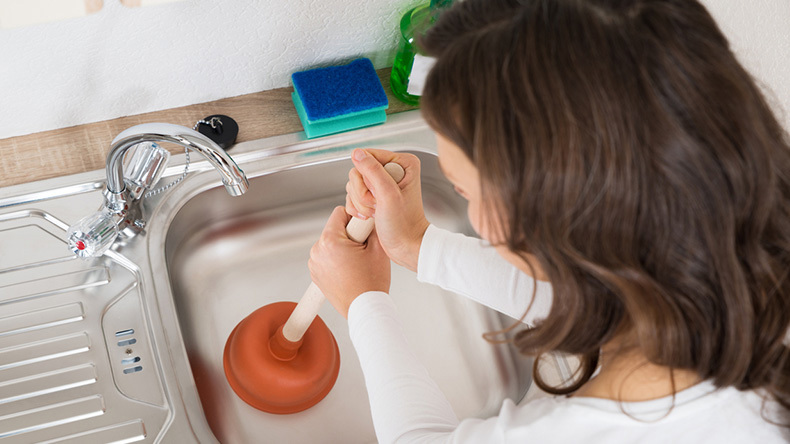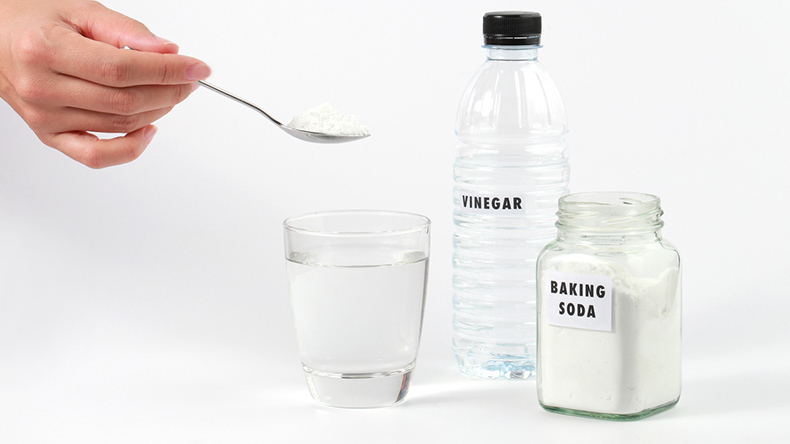Having a kitchen sink that smells is never a pleasant experience, but there's no reason to panic! In this guide we will outline the reasons why your kitchen sink might be smelling and help you fix it - for good!
Why does my sink smell?
A smelly kitchen sink will usually be caused by either an accumulation of food within your drainpipe or an issue with your U-bend which is causing sewer gases to escape up through your drain. The type of smell can sometimes help you determine the issue.
Sink smells & is draining slowly
If you've got a smelly kitchen sink and the water isn't draining away, it's likely some sort of food blockage has caused the smell.
Sink smells like rotten food
If your sink smells like rotten food, then it's likely that an accumulation of fats, oils and grease within your pipework is causing the smell.
Sink smells like rotten eggs
If your kitchen sink has the very distinct smell of rotten eggs, it's likely this is being caused by an issue with your U-bend allowing sewer gases to escape.
To stop your kitchen sink smelling you'll need to deal with these issues. We've outlined some ways you can below:
How to stop your sink smelling
- Boiling water
- Plunger
- White vinegar
- Baking soda & vinegar
- Check the U-bend
Boiling water
Dominic Lees-Bell, kitchen expert at Tap Warehouse advises, "you can shift a blockage causing your kitchen sink to smell simply with boiling water. Before you do this, try and remove as much of the water from the sink as possible and pour around 2 litres of boiling water down the drain.
"Once this has settled for 5 minutes, pour 2 litres of cold water into the drain, which should cause any remaining grease to congeal."
These steps should clear the blockage and hopefully the smell.

Plunger
With a little bit of effort, you can clear a smelly drain using a plunger. First, fill your sink so it's half full. If you have a double kitchen sink, use a plug or wet cloth to seal off the other drain.
With the cup of your plunger completely covering the drain, push it up and down several times. Then, remove the plunger to see if any of the water starts to drain away. If it does, it's working and you can continue plunging in order to clear the drain and the smell.

White vinegar
White vinegar has many uses around the home and that includes cleaning out a smelly sink. Measure a cup of white vinegar and pour it directly down the drain. Allow the white vinegar to work for around 30 minutes then rinse the sink with hot water.
Baking soda & vinegar
If the vinegar on its own didn't do the trick, you can also try combining it with some baking soda.
First, pour half a cup of baking soda straight down the plughole. Then, follow that up with a cup of vinegar. These two should react to form a foamy solution. You can leave this solution to work for at least two hours before pouring some boiling water down the drain to clear it away. If it's worked, the solution should have flushed out whatever was causing your kitchen sink to smell.

Check the U Bend
As we've previously mentioned, if your sink smells like rotten eggs, this is likely caused by an issue with your U-bend. The U-bend is designed to be full of water, which will act as a barrier against any smells from sewer gases. If this water is no longer there, it could be allowing the gases up through your drain, causing that rotten egg smell.

Things to check:
U-bend leak
If there's a leak in the pipework under your sink, the water won't be able to stay in the U-bend. Check underneath your sink for any damp patches or run the tap and check for leaks.
If you find a leak, this could be caused by poorly tightened or cross threaded connections. In both cases, this can usually be fixed by unscrewing all the connections then tightening them back up again properly.
If there's still a leak after you've tightened the connections, you could also try replacing some of the parts, including replacing the entire U-bend, which costs less than you might think.
U-bend blockage
There could be a blockage in the U-bend which is causing the smell. To diagnose this, you'll need to take it apart and look inside, potentially using a piece of wire to hook out the blockage.
Water in the U-bend evaporated
Lastly, the smell could be coming through your u-bend because the water inside it has evaporated. This can happen in warmer weather when you haven't used your sink for a while and can be resolved by simply running the tap.
Preventing a smelly sink
Once you've experienced the horror of a smelly sink, you'll want to do everything you can to prevent it happening again. Try to avoid pouring the following down your kitchen sink:
- Fats, oils and grease
- Rice, pasta and other starchy foods
- Egg shells
- Coffee grounds
How to keep your kitchen garbage disposal from smelling
Sometimes kitchen disposal units can require a little extra help to clear.
Running ice cubes down the disposal not only cleans the disposal blades, the cold temperature of the ice also helps to collect any excess grease within the disposal unit and remove it. Another ideal way to eliminate grease is to grind citrus peel from a lemon or orange and let it spin around the unit until it’s gone. Not only is this method highly effective, it also gives off a nice citrus smell.
Having a smelly kitchen sink is never pleasant, but with these simple steps we hope we've been able to fix the problem! If you've tried all of the above to no avail, it may be time to enlist the help of a plumber.











